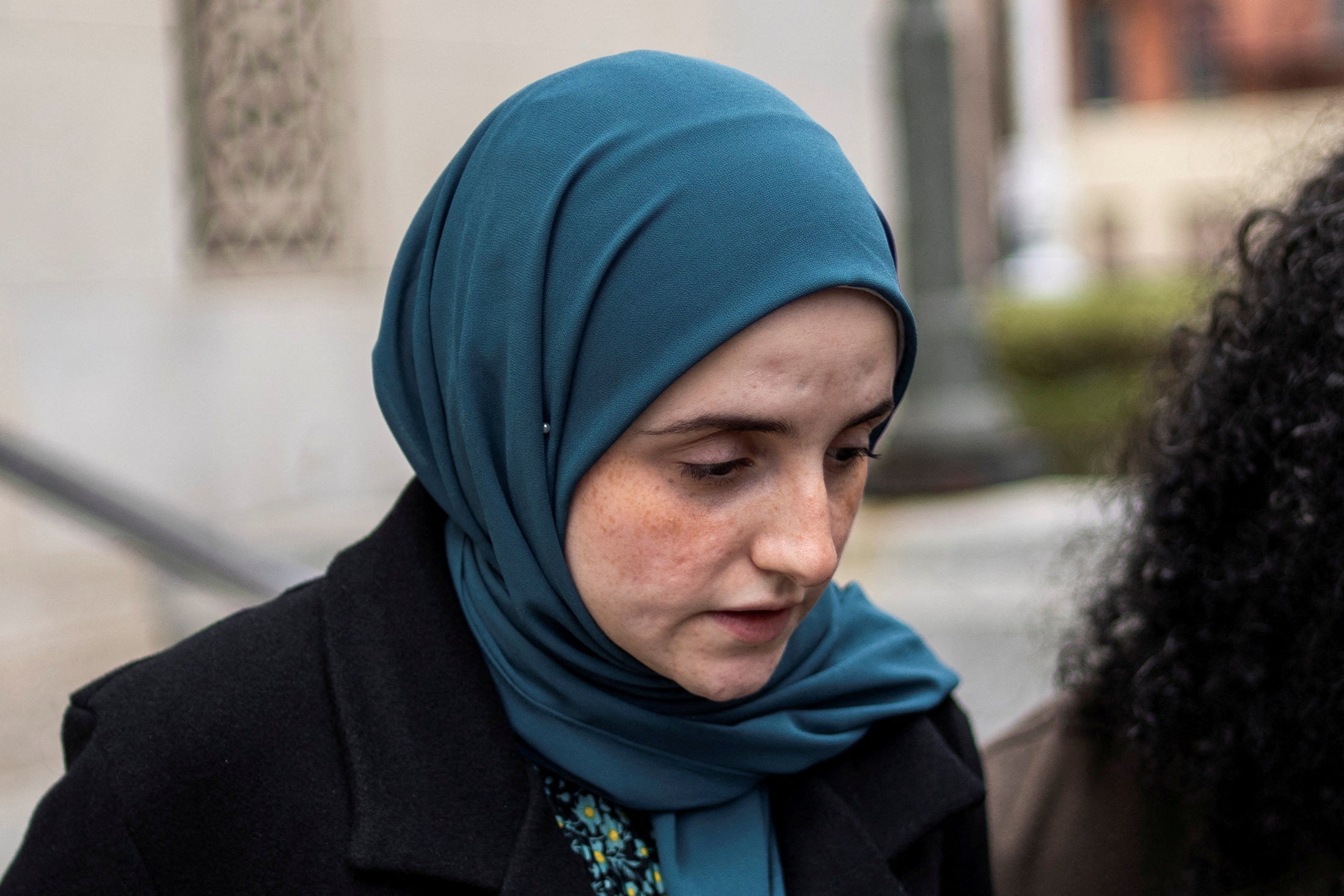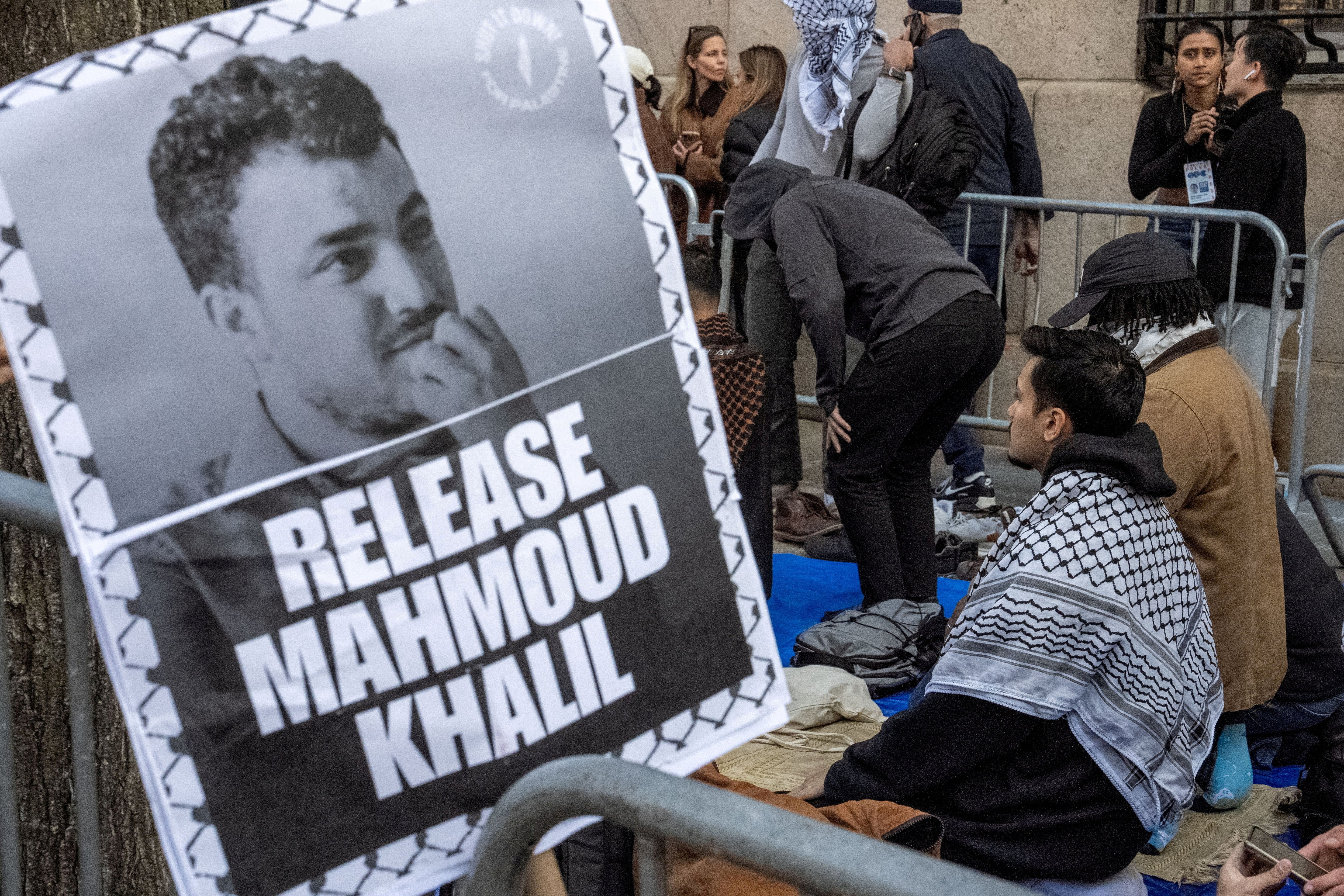Mahmoud Khalil, the Columbia University graduate who was arrested by federal immigration authorities for his role leading pro-Palestine demonstrations on campus, was denied permission to attend the birth of his child.
His wife Noor Abdalla gave birth to a boy on April 21.
Khalil was stripped of his green card and arrested in front of his then-pregnant wife in their New York City apartment building on March 8. He was sent to an Immigration and Customs Enforcement detention center in Louisiana, roughly 1,300 miles away from New York.
Court filings show his attorneys repeatedly requested permission from ICE for his temporary release to be present for his child’s birth. Khalil was “open to any combination of conditions,” including wearing an ankle monitor. A request on Sunday was denied roughly 30 minutes later.
“This was a purposeful decision by ICE to make me, Mahmoud, and our son suffer,” Abdalla said in a statement.
“My son and I should not be navigating his first days on earth without Mahmoud,” she said. “ICE and the Trump administration have stolen these precious moments from our family in an attempt to silence Mahmoud’s support for Palestinian freedom. I will continue to fight every day for Mahmoud to come home to us. I know when Mahmoud is freed, he will show our son how to be brave, thoughtful, and compassionate, just like his dad.”

On April 11, Louisiana immigration judge Jamee Comans determined Khalil can be deported from the United States based on Secretary of State Marco Rubio’s claim that Khalil’s Palestinian advocacy presents a threat to U.S. foreign policy. Judge Comans called the government’s argument “facially reasonable.”
Khalil’s arrest has sparked international outrage and fears that Donald Trump’s administration is trying to crush political dissent, starting with campus demonstrations against Israel’s devastating campaign in Gaza and U.S. support.
Rubio has revoked hundreds of student visas over campus activism, leading to several high-profile arrests of international scholars who are now awaiting deportation hearings in remote jails across the southern United States.
The administration has accused Khalil of “antisemitic activities” and supporting Hamas, which he has flatly rejected. Officials concede he has not committed any crime, but claim he can be removed over what Rubio has characterized as “potentially serious adverse foreign policy consequences.”
A two-page memorandum submitted to the immigration court as evidence for his removal admitted his protest activities were “lawful” but argued that letting him stay in the country would undermine “U.S. policy to combat antisemitism around the world and in the United States, in addition to efforts to protect Jewish students from harassment and violence in the United States.”
Khalil and his legal team argue his arrest and detention — and attempted removal from the country, which is currently blocked by court order — are retaliatory violations of his First Amendment right to freedom of speech and his Fifth Amendment right to due process of law, among other claims.
A separate but parallel case challenging the constitutionality of his arrest is also playing out in a federal courtroom in New Jersey, where his attorneys successfully moved jurisdiction to handle a legal challenge to his arrest.

Khalil, who is Palestinian, grew up in a refugee camp in Syria. He entered the United States on a student visa in 2022 to pursue a master’s degree in public administration, which he completed last year. His anticipated graduation date is May 2025.
He became a lawful permanent resident in 2024.
The Louisiana judge gave Khalil’s lawyers until April 23 to argue against his removal to Syria or Algeria, where he has citizenship.
“I would like to quote what you said last time that there’s nothing that’s more important to this court than due process rights and fundamental fairness,” Khalil said at the end of his immigration court hearing in Jena, Louisiana on April 11.
“Clearly what we witnessed today, neither of these principles were present today or in this whole process,” he added. “This is exactly why the Trump administration has sent me to this court, 1,000 miles away from my family. I just hope that the urgency that you deemed fit for me are afforded to the hundreds of others who have been here without hearing for months.”
A group of Democratic members of Congress are expected to visit Khalil and other international student activists detained in Louisiana’s ICE facilities on Tuesday.
Following an order from a federal judge last week, Tufts University doctoral student Rumeysa Ozturk — who was arrested and threatened with removal from the country after writing an op-ed criticizing Israel — is expected to be moved from Louisiana to Vermont as she challenges the constitutionality of her arrest.
On Monday, Vermont Senator Peter Welch met with Mohsen Mahdawi, another Palestinian student activist from Columbia University who was arrested by federal agents during what he believed was a citizenship interview.
In a filmed interview with the senator inside a detention center in Vermont, Mahdawi said Rubio’s invocation of a rarely used provision of the Immigration and Nationality Act to target people who are perceived as threats to foreign policy is conflating “being anti-war as antisemitic.”
“How could that be possible when my partners, most of my partners at Columbia’s campus, and beyond, are Jews and Israelis? My work has been centered on peacemaking,” he said. “My hope and my dream is … to see an end to the war, an end to the killing, and to see a peaceful resolution between Palestinians and Israelis. How could this be a threat to anybody except the war machine that is feeding this?”

